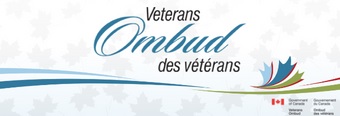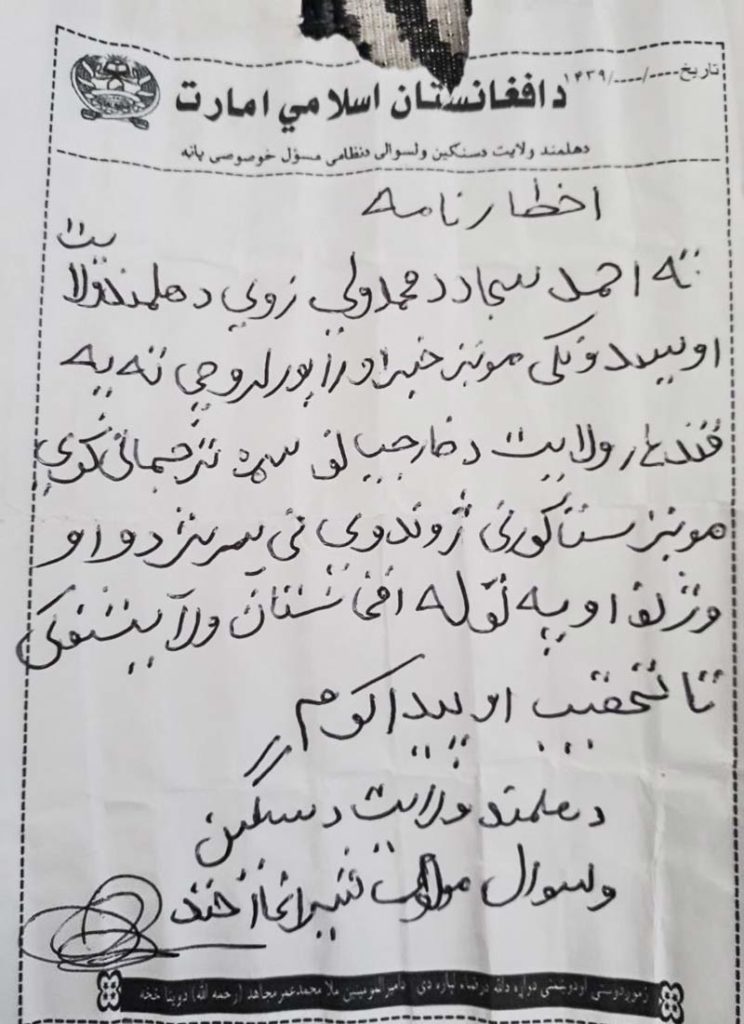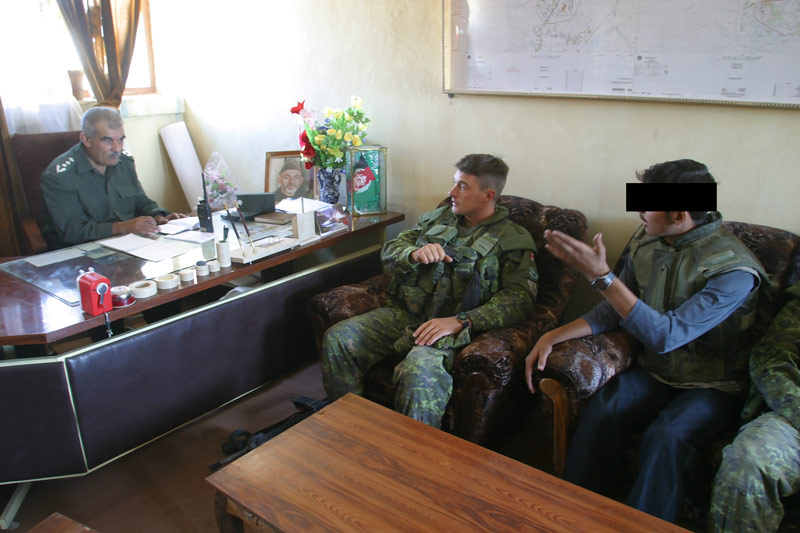
Major John Vass of the 3RCR Battle Group speaks with a village elder through an interpreter near Kabul on Sept. 20, 2003. The translator’s identity is protected to prevent Taliban retribution. [Stephen J. Thorne/CP]
The American pullout has refocused attention on the plight of an estimated 115 so-called LECs (locally employed civilians) who missed out on a brief resettlement program instituted by the former Conservative government.
Taliban fighters have executed numerous interpreters and other collaborators.
Several news organizations, including Reuters, The Globe and Mail and The National Post, quoted government sources in reporting that Ottawa plans to evacuate hundreds of collaborators and their families after President Joe Biden said he would bring up to 100,000 Afghans to the United States, including more than 1,000 interpreters, as American troops exited the war-torn country.
The initial Canadian program resettled almost 800 Afghans, mainly interpreters and their families, before it ended in 2011. Those still seeking to escape Taliban retribution for collaborating with Canadians include military and diplomatic interpreters, cooks, plumbers, engineers and embassy staff.
Taliban fighters have executed numerous interpreters and other collaborators, while others have been in protracted hiding. Afghanistan veterans and civilian activists have been pressing for their evacuation and resettlement for years.
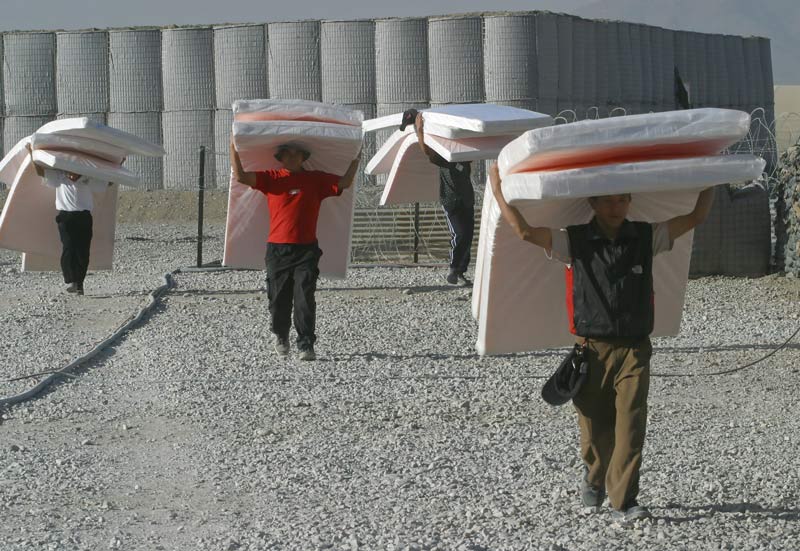
Civilian workers—some from Nepal, others local—carry mattresses at Camp Julien in Kabul on Oct. 14, 2003. [Stephen J. Thorne/CP]
“Instead of being proactive and working effectively on getting these guys out in a safe and orderly manner, the response is now reactive in the 11th hour due largely to the mounting media attention given to the pullout [and the] negative media attention here at home.”
“Welcome news but short on specifics,” Red T, a New York-based translators’ advocacy group, tweeted in response to news that Canada plans to take in a new round of Afghan interpreters and others.
At this writing, Taliban fighters had surrounded Kandahar Central Jail. Speaking in an interview with Legion Magazine, Long said her small group, simply called Afghan-Canadian Interpreters, was “furiously trying to identify those still in Kandahar and working at extracting them.
“So far we have confirmation of two who are safe in Kabul now.”
“The imminent withdrawal of NATO forces leads us to assess that a cataclysmic civil war looms.”
Three former Canadian task force commanders—retired major-generals Denis Thompson, Dean Milner and David Fraser—wrote an appeal to Immigration Minister Marco Mendicino last week urging him to revive the resettlement program amid “tremendous uncertainty inside Afghanistan.”
“The recent advances of the Taliban are unsettling and the potentially violent consequences that await people in authority and their supporters cannot be ignored,” said the letter, dated July 8.
“The imminent withdrawal of NATO forces leads us to assess that a cataclysmic civil war looms,” the generals wrote. “Timely and decisive action is required for practical and moral reasons.
“There is an acute need to ensure the safety and well-being of those Afghan nationals who served alongside Canadian soldiers, development officers and diplomats during our intervention.
“Between 2006-2011, at least six interpreters were killed alongside our troops. Many more are likely to die without our immediate assistance.”
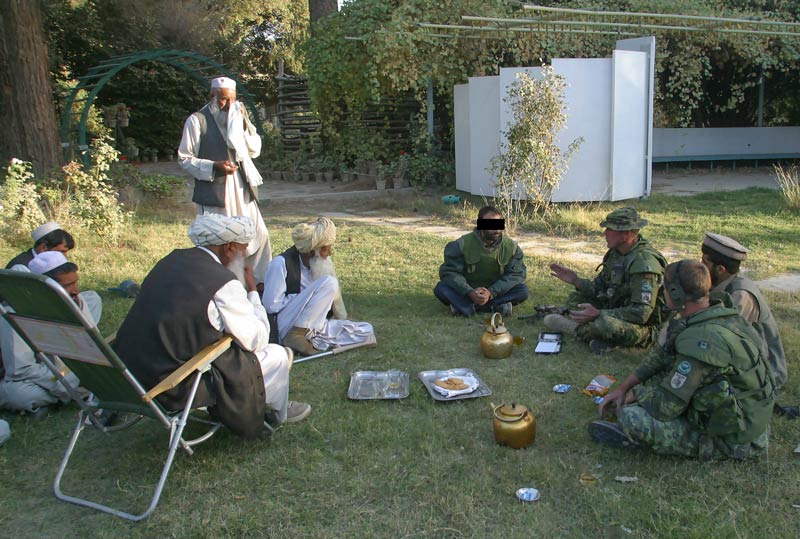
Members of the 3RCR Battle Group meet with village elders south of Kabul on Oct. 9, 2003. The translator’s identity is protected to prevent retribution. [Stephen J. Thorne/CP]
Long said Afghan-Canadian Interpreters had 115 names of LECs and were working with Liberal MP Marcus Powlowski to identify more and find their military mentors in Canada. She urged veterans who knew of Afghans that were ultimately left behind to come forward and vouch for them.
Last month, Human Rights Watch issued a statement calling on coalition countries, including Canada, to accelerate visa processing and relocation of Afghan interpreters and others who contributed to the cause.
“Afghans who worked with foreign troops or embassies face huge risks of retaliation from the Taliban,” said Patricia Grossman, the organization’s associate Asia director. “Departing countries should commit to assisting Afghans who reasonably face danger because of their work with foreign forces.”
In a June 7 statement, the Taliban denied that former interpreters and others who worked for foreign forces were at risk, but warned they should “show remorse for their past actions and…not engage in such activities in the future that amount to treason against Islam and the country.”
But the Taliban have long targeted civilians, particularly those they say worked for the Afghan government or foreigners. In January, Taliban insurgents reportedly killed an interpreter who had worked for U.S. forces for 12 years. Others have received death threats.
Ahmad Sajad Kazimi’s parents started receiving night letters at their home in Helmand province soon after he started translating for Canadian and other NATO forces.
“They don’t finish an interpreter’s life with just a single bullet. They torture interpreters to death.”
“Tell your son to quit his job and stop working for coalition forces,” one said. “Otherwise we kill your son because he is co-operating with the infidels!”
“You AHMAD SAJAD, son of Mohammad Wali, resident of Helmand province,” began another, “we found out that you are working as a linguist with Foreigners in KANDAHAR province. We won’t hesitate in killing your family.
“We are looking [for] you in all other provinces of Afghanistan.”
It was signed Mawlawi Shir Agha Akhond, (Taliban) governor of Sangin district, Helmand, Afghanistan.
Kazimi, better known to the troops he worked with by his nickname Alex, was in hiding with his wife virtually from the time the Canadians left in 2014 until late-June 2021, when he and his family were evacuated to the U.S. The couple’s first child was born in their refuge in 2018.“The Taliban and ISIS are worse than wild animals,” he said in an interview with Legion Magazine from Afghanistan at the time. “They don’t finish an interpreter’s life with just a single bullet. They torture interpreters to death.
“They only use bullets when they come after their targets into the restricted areas like cities with high security.”
One translator was beheaded, his severed head left on his chest on the Kabul-Kandahar highway. Another was simply shot. A picture of him lying in peaceful repose with a single bullet hole beneath his chin turned up on a Facebook page.
Biden said July 8 that he was working with Congress to change a law preventing American authorities from evacuating Afghans to the U.S. for safekeeping until their visas are processed.
Meanwhile, the administration had identified American facilities outside of the continental United States where evacuated Afghans could stay while their visa applications are processed.
“Our message to those women and men is clear,” Biden said. “There is a home for you in the United States if you so choose. We will stand with you, just as you stood with us.”
Canada’s message has not been so clear.
Long’s group said stranded coalition workers are “at imminent risk of being captured, tortured, raped and murdered for their support to NATO during the war against the Taliban.”
“The Taliban reportedly now control over 80 per cent of the country and the window to evacuate these affected individuals is rapidly closing,” it said in a statement.
“We call on the honourable Justin Trudeau, Marco Mendicino, Harjit Sajjan and the entire Canadian federal government to take immediate action and evacuate these affected individuals before it is too late.”
Added the generals: “Many Canadian veterans are in contact with the Afghans who served alongside them and their stories are harrowing. These people are considered ‘comrades-in-arms’ and their plight is affecting these veterans—as it should all Canadians.… We the undersigned as former Canadian Task Force Commanders call upon the government to take decisive action and bring our interpreters to safety in Canada.”
—
Read the story of Alex and other Afghans who worked for Canada’s military mission here.
Advertisement








